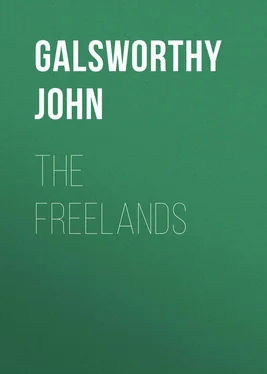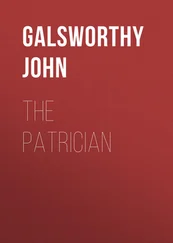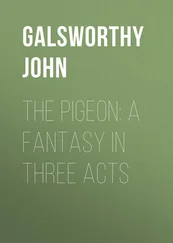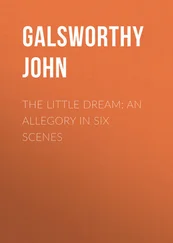John Galsworthy - The Freelands
Здесь есть возможность читать онлайн «John Galsworthy - The Freelands» — ознакомительный отрывок электронной книги совершенно бесплатно, а после прочтения отрывка купить полную версию. В некоторых случаях можно слушать аудио, скачать через торрент в формате fb2 и присутствует краткое содержание. Жанр: foreign_antique, foreign_prose, на английском языке. Описание произведения, (предисловие) а так же отзывы посетителей доступны на портале библиотеки ЛибКат.
- Название:The Freelands
- Автор:
- Жанр:
- Год:неизвестен
- ISBN:нет данных
- Рейтинг книги:5 / 5. Голосов: 1
-
Избранное:Добавить в избранное
- Отзывы:
-
Ваша оценка:
- 100
- 1
- 2
- 3
- 4
- 5
The Freelands: краткое содержание, описание и аннотация
Предлагаем к чтению аннотацию, описание, краткое содержание или предисловие (зависит от того, что написал сам автор книги «The Freelands»). Если вы не нашли необходимую информацию о книге — напишите в комментариях, мы постараемся отыскать её.
The Freelands — читать онлайн ознакомительный отрывок
Ниже представлен текст книги, разбитый по страницам. Система сохранения места последней прочитанной страницы, позволяет с удобством читать онлайн бесплатно книгу «The Freelands», без необходимости каждый раз заново искать на чём Вы остановились. Поставьте закладку, и сможете в любой момент перейти на страницу, на которой закончили чтение.
Интервал:
Закладка:
Felix interrupted quietly:
“I draw it at Lady Malloring.”
“Well, I won’t argue that with you. But it really is a scandal that Tod’s wife should incite her young people to stir up the villagers. Goodness knows where that mayn’t lead! Tod’s cottage and land, you see, are freehold, the only freehold thereabouts; and his being a brother of Stanley’s makes it particularly awkward for the Mallorings.”
“Quite so!” murmured Felix.
“Yes, but my dear Felix, when it comes to infecting those simple people with inflated ideas of their rights, it’s serious, especially in the country. I’m told there’s really quite a violent feeling. I hear from Alice Gaunt that the young Tods have been going about saying that dogs are better off than people treated in this fashion, which, of course, is all nonsense, and making far too much of a small matter. Don’t you think so?”
But Felix only smiled his peculiar, sweetish smile, and answered:
“I’m glad to have come down just now.”
Clara, who did not know that when Felix smiled like that he was angry, agreed.
“Yes,” she said; “you’re an observer. You will see the thing in right perspective.”
“I shall endeavor to. What does Tod say?”
“Oh! Tod never seems to say anything. At least, I never hear of it.”
Felix murmured:
“Tod is a well in the desert.”
To which deep saying Clara made no reply, not indeed understanding in the least what it might signify.
That evening, when Alan, having had his fill of billiards, had left the smoking-room and gone to bed, Felix remarked to Stanley:
“I say, what sort of people are these Mallorings?”
Stanley, who was settling himself for the twenty minutes of whiskey, potash, and a Review, with which he commonly composed his mind before retiring, answered negligently:
“The Mallorings? Oh! about the best type of landowner we’ve got.”
“What exactly do you mean by that?”
Stanley took his time to answer, for below his bluff good-nature he had the tenacious, if somewhat slow, precision of an English man of business, mingled with a certain mistrust of ‘old Felix.’
“Well,” he said at last, “they build good cottages, yellow brick, d – d ugly, I must say; look after the character of their tenants; give ‘em rebate of rent if there’s a bad harvest; encourage stock-breedin’, and machinery – they’ve got some of my ploughs, but the people don’t like ‘em, and, as a matter of fact, they’re right – they’re not made for these small fields; set an example goin’ to church; patronize the Rifle Range; buy up the pubs when they can, and run ‘em themselves; send out jelly, and let people over their place on bank holidays. Dash it all, I don’t know what they don’t do. Why?”
“Are they liked?”
“Liked? No, I should hardly think they were liked; respected, and all that. Malloring’s a steady fellow, keen man on housing, and a gentleman; she’s a bit too much perhaps on the pious side. They’ve got one of the finest Georgian houses in the country. Altogether they’re what you call ‘model.’”
“But not human.”
Stanley slightly lowered the Review and looked across it at his brother. It was evident to him that ‘old Felix’ was in one of his free-thinking moods.
“They’re domestic,” he said, “and fond of their children, and pleasant neighbors. I don’t deny that they’ve got a tremendous sense of duty, but we want that in these days.”
“Duty to what?”
Stanley raised his level eyebrows. It was a stumper. Without great care he felt that he would be getting over the border into the uncharted land of speculation and philosophy, wandering on paths that led him nowhere.
“If you lived in the country, old man,” he said, “you wouldn’t ask that sort of question.”
“You don’t imagine,” said Felix, “that you or the Mallorings live in the country? Why, you landlords are every bit as much town dwellers as I am – thought, habit, dress, faith, souls, all town stuff. There IS no ‘country’ in England now for us of the ‘upper classes.’ It’s gone. I repeat: Duty to what?”
And, rising, he went over to the window, looking out at the moonlit lawn, overcome by a sudden aversion from more talk. Of what use were words from a mind tuned in one key to a mind tuned in another? And yet, so ingrained was his habit of discussion, that he promptly went on:
“The Mallorings, I’ve not the slightest doubt, believe it their duty to look after the morals of those who live on their property. There are three things to be said about that: One – you can’t make people moral by adopting the attitude of the schoolmaster. Two – it implies that they consider themselves more moral than their neighbors. Three – it’s a theory so convenient to their security that they would be exceptionally good people if they did not adopt it; but, from your account, they are not so much exceptionally as just typically good people. What you call their sense of duty, Stanley, is really their sense of self-preservation coupled with their sense of superiority.”
“H’m!” said Stanley; “I don’t know that I quite follow you.”
“I always hate an odor of sanctity. I’d prefer them to say frankly: ‘This is my property, and you’ll jolly well do what I tell you, on it.’”
“But, my dear chap, after all, they really ARE superior.”
“That,” said Felix, “I emphatically question. Put your Mallorings to earn their living on fifteen to eighteen shillings a week, and where would they be? The Mallorings have certain virtues, no doubt, natural to their fortunate environment, but of the primitive virtues of patience, hardihood, perpetual, almost unconscious self-sacrifice, and cheerfulness in the face of a hard fate, they are no more the equals of the people they pretend to be superior to than I am your equal as a man of business.”
“Hang it!” was Stanley’s answer, “what a d – d old heretic you are!”
Felix frowned. “Am I? Be honest! Take the life of a Malloring and take it at its best; see how it stands comparison in the ordinary virtues with those of an averagely good specimen of a farm-laborer. Your Malloring is called with a cup of tea, at, say, seven o’clock, out of a nice, clean, warm bed; he gets into a bath that has been got ready for him; into clothes and boots that have been brushed for him; and goes down to a room where there’s a fire burning already if it’s a cold day, writes a few letters, perhaps, before eating a breakfast of exactly what he likes, nicely prepared for him, and reading the newspaper that best comforts his soul; when he has eaten and read, he lights his cigar or his pipe and attends to his digestion in the most sanitary and comfortable fashion; then in his study he sits down to steady direction of other people, either by interview or by writing letters, or what not. In this way, between directing people and eating what he likes, he passes the whole day, except that for two or three hours, sometimes indeed seven or eight hours, he attends to his physique by riding, motoring, playing a game, or indulging in a sport that he has chosen for himself. And, at the end of all that, he probably has another bath that has been made ready for him, puts on clean clothes that have been put out for him, goes down to a good dinner that has been cooked for him, smokes, reads, learns, and inwardly digests, or else plays cards, billiards, and acts host till he is sleepy, and so to bed, in a clean, warm bed, in a clean, fresh room. Is that exaggerated?”
“No; but when you talk of his directing other people, you forget that he is doing what they couldn’t.”
“He may be doing what they couldn’t; but ordinary directive ability is not born in a man; it’s acquired by habit and training. Suppose fortune had reversed them at birth, the Gaunt or Tryst would by now have it and the Malloring would not. The accident that they were not reversed at birth has given the Malloring a thousandfold advantage.”
Читать дальшеИнтервал:
Закладка:
Похожие книги на «The Freelands»
Представляем Вашему вниманию похожие книги на «The Freelands» списком для выбора. Мы отобрали схожую по названию и смыслу литературу в надежде предоставить читателям больше вариантов отыскать новые, интересные, ещё непрочитанные произведения.
Обсуждение, отзывы о книге «The Freelands» и просто собственные мнения читателей. Оставьте ваши комментарии, напишите, что Вы думаете о произведении, его смысле или главных героях. Укажите что конкретно понравилось, а что нет, и почему Вы так считаете.












